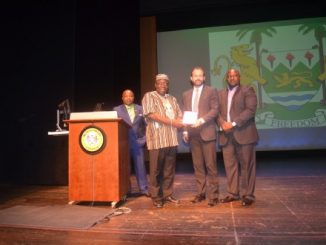
Regional One Health Platform launched in Makeni and Bo
By Kadrie Koroma
The Ministries of Health and Sanitation, Agriculture Forestry and Food Security, and Local Government and Rural Development, the Environmental Protection Agency (EPA) and Office of the National Security have launched the Regional One Health Platform in Makeni for the northern region and Bo for the south and eastern region at the Bo-Makeni Sahara Hotel.
Group photo of One Health partners
It could be recalled that the Vice President, Dr. Victor Bockarie Foh on June 23, 2017 launched the National One Health Platform at the Miatta Conference Centre in Freetown and stressed the need to be replicated in the districts.
Launching the Regional One Health Platform in Makeni and Bo, the Deputy Chief Medical Officer 1, Dr. Sarian Kamara disclosed that Sierra Leone has become the first country in West Africa and the first Post-Ebola country to launch its National One Health Platform with a defined structure. She described the Platform as a big step forward in ensuring better coordination in the management of zoonotic diseases and other public health events, and ways they can potentially affect human lives.
Dr. Kamara disclosed that 60 percent of pathogens affecting humans are of animal origin with 75 percent of emerging pathogens coming from animals, adding that zoonotic diseases have become a growing threat to human lives.
She informed her audience that since the end of the Ebola outbreak, under the Ministry of Health Post-Ebola Recovery Framework, the Ministry has been working at ensuring that the right surveillance and reporting systems are in place to prevent, detect and control infectious diseases from turning into a new outbreak.
Dr. Kamara reminded all that it is now time to learn from the past lessons, build on existing achievements, and push the collaboration between institutions to guarantee that such epidemics don’t take place again.
The Deputy Chief Medical Officer stated that the One Health approach represent a powerful framework that is based on the understanding that human health, animal health and environmental health are all interlinked and require a coordinated approach to managed accordingly.
She said One Health is the collaborative efforts of multiple disciplines working together to attain optimal health for people, animals, plants and the environment.
USAID National One Health Technical Advisor, Preparedness and Response Project, Muke Kenneth Fahnbulleh said One Health is the cornerstone of the Global Health Security Agenda, and the U.S Government is proud to support the initiative.
He reminded all that the Global Health Security is an international partnership that aims to create a world safe and secure from infectious disease threats, noting that since the launch in February 2014, more than 50 countries have endorsed it, and the U.S. Government has committed to establishing a global capacity to address and respond to devastating diseases from animals, humans, and the environment.
Muke Fahnbulleh assured of United States commitment to achieve all the Global Health Security Agenda target not only at home but globally.
WHO Officer-In-Charge, Alexander Chimbaru said Health Security is crucial in a world increasingly threatened by emerging and re-emerging diseases, adding that the rise of antimicrobial resistance and other health emergencies that put intense pressure not only on health services, but also on economics and the society as a whole.
He described the launch of One Health Platform as timely as key priority areas will be to strengthen the coordination mechanism at national and districts level, strengthen surveillance systems for priority zoonotic diseases and pathogens, antimicrobial resistance monitoring and ensure mechanisms for responding to zoonoses are in place.
Mr. Chimbaru disclosed that countries in African region report an average of 80 to 100 acute public health events and more than 80 percent of which are infectious diseases, noting that about 75 percent of the emerging infectious diseases are zoonotic in nature, and outbreaks of the disease frequently reported include Lassa Fever, Ebola virus disease, Marburg and Rift valley fever.
He appealed to his audience to go beyond the launch to speak one health, think one health, and integrate one health into their plans to succeed in controlling zoonotic diseases and anti-microbial resistance.
The Deputy Chief Agriculture Officer 1, and Director Livestock and Veterinary Division, Ministry of Agriculture Forestry and Food Security, Mr. Sorie Mohamed Kamara commended the Ministry of Health for taking the lead, disclosing that they have been working with the Health Ministry since the start of Avian Influenza in 2005.
The Senior Regional Environment Officer, South, Environmental Protection Agency (EPA-SL) Aiah Wurie Kembay said the One Health Platform is timely to undertake national action plan for health security, embracing multi-sectoral partnership to prevent, prepare and respond to disease threats.
He told the gathering that the mandate of EPA-SL is to coordinate and monitor the implementation of all national environmental policies, plans and programmes as well as projects in achieving the Sustainable Development Goals (SDGs) and ensuring environmentally sound and sustainable development countrywide.
Mr. Kembay assured of EPAs continuous work with partners in the One Health Platform for policies formulation and programmes that will help reduce chemical and other environmental exposures in air, water, soil and food to protect people and provide communities with healthier environment.



